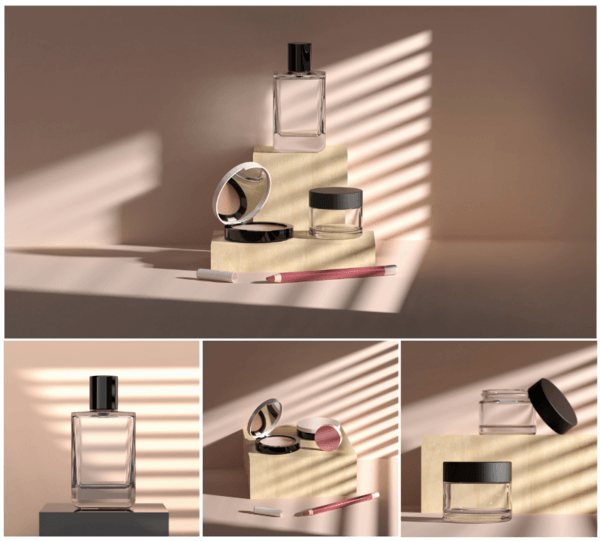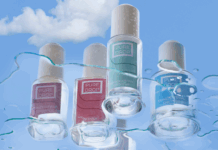Beauty brands are looking for eco-friendly alternatives to conventional plastic packaging - but high-end brands have high-end requirements. With its wide range of applications, Sulapac's expanded product line allows cosmetic brands to achieve their sustainability goals without compromising on quality or aesthetics. Today, Sulapac is expanding its offer with a brand new biosourced material perfect for perfume closures.
As part of the development of its range of packaging products for the cosmetics and beauty sector, the award-winning biodegradable materials start-up Sulapac is launching Sulapac Luxe, a new biosourced material perfect for replacing hard plastics, including ABS plastics. This new material meets the requirements of leading brands in the cosmetics industry who demand packaging solutions that are both environmentally friendly and able to maintain the feel, functionality and aesthetics of their luxury products.
"One of the major challenges for beauty brands is that they have to consider very strict performance criteria when they consider replacing conventional plastics, explains Colin StrobantInternational Sales Manager at Sulapac.
With Sulapac Luxe, we are demonstrating that conventional plastics can be easily replaced without having to make concessions in quality. We have listened to our customers about the challenges they face. This new material has undergone an extensive development process to ensure that it meets the performance requirements of the luxury sector.
Resistance to temperature fluctuations, high density, ceramic feel and sound, smooth and shiny surface: these are some of the characteristics of this material. And it just so happens that luxury brands attach great importance to these characteristics. Sulapac Luxe is not only recyclable, but like all Sulapac materials, it can also be made with recycled content, another important criteria for many luxury brands, according to Colin Strobant. "Sulapac is a pioneer in biobased and recycled materials, and our goal is to use only recycled bioplastics and polymers within five years." says the CEO and co-founder of Sulapac, the Dr.Suvi Haimi. Made of industrially compostable materials, Sulapac Luxe leaves no microplastic or permanent toxic load behind.
Several high-end beauty brands have already expressed interest in this material and are considering using Sulapac Luxe with their existing glass bottles or jars. The material is commercially available and fits seamlessly into existing injection molding production lines.
Eco-responsible solutions for various applications and production technologies
With its expanded product range, Sulapac's customers can now create packaging for different sectors such as skincare creams, make-up products and fragrances. Shiseido's Ulé line uses Sulapac for its closures, and it is far from alone as a wide range of skincare brands from Lumene to Manik package their products in Sulapac jars. The wide selection of materials and production techniques allows brands to choose between a matte, glossy or satin finish, as well as a wide range of colors.
The successful launch of Schwan Cosmetics' BetterBarrel last year, and Toly's highly acclaimed Infinity Line for compact powders manufactured with Sulapac, further demonstrate the versatility of Sulapac's offering. Sulapac is also developing high-end solutions in collaboration with Chanel, including eco-responsible bottle caps created exclusively for the Les Eaux De Chanel fragrance line and the lid for Chanel's N° 1 cream.
In addition to materials used for injection molding and extrusion, Sulapac's range includes solutions for thermoforming that allow cosmetic companies to create environmentally friendly transport trays and displays, as well as solutions for 3D printing that allow for eco-friendly prototyping.
Regulations and ambitious sustainability goals are driving brands to adopt bio-based and circular solutions
The demand for environmentally friendly solutions continues to grow as the search for alternatives to some conventional plastics widely used in cosmetic packaging, notably thermoset materials, becomes more widespread among companies. These non-recyclable materials may be subject to restrictions under the European Commission's forthcoming Regulation on packaging and packaging waste (EPR). National restrictions are also expected for certain materials, such as ABS plastic, and these restrictions will undoubtedly push companies toward more sustainable solutions.
"We are pleased to see the positive movement within the cosmetics industry as more and more brands are moving away from conventional plastic. Our job is to make this transition as easy and beneficial as possible - for the brands, their customers and the environmentsays Suvi Haimi.
In Sulapac materials, the characteristics of sustainability, circularity, functionality and aesthetics are uniquely combined. This allows our cosmetic customers to truly achieve their sustainability goals and meet regulatory requirements while promoting a premium image and an impeccable customer experience."concludes Colin Strobant








